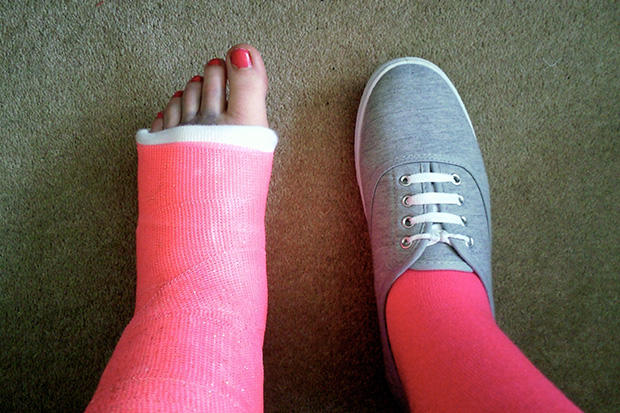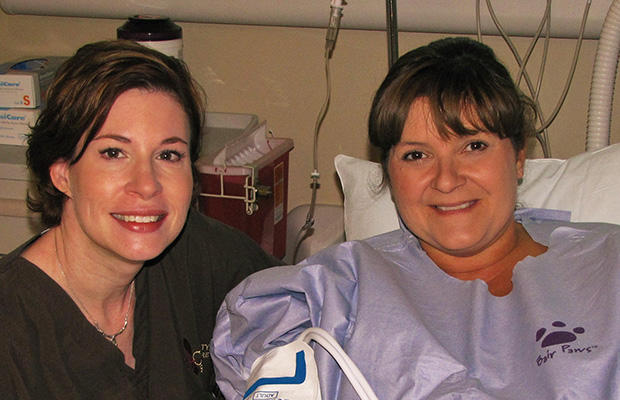Learn how to tame ghrelin and leptin so you can finally lose weight with The Hormone Balancing Diet by Marjorie Nolan, MS, RD.
You're on meds that make you gain weight
Several types of anti-depressants, specifically SSRIs such as Paxil and Zoloft, increase appetite while others, such as beta-blockers, can cause you to feel lethargic by lowering your heart rate and making it harder to work out. Both can lead to eating more or moving less. Either way, you have choices, says Dana Simpler, MD, an internist with Mercy Medical Center in Baltimore, MD. If possible, “ask your doctor to replace your medication with one that doesn’t cause weight gain.” If your meds trigger cravings, keeping your blood sugar stable can help you combat them, says Amy Goodson, RD, sports dietitian for the Texas Rangers. “Ideally try to eat five to six small meals a day with a whole grain and lean protein at every meal and snack.”
You're unable to exercise

Whether you're recovering from an illness or injury or otherwise can't get in a single minute of exercise, you can still lose weight, says Tom Holland, MS, CSCS, exercise physiologist and author of Beat the Gym. “Turn your situation into an opportunity to change your workout routine; maybe you could try a less strenuous workout like yoga.” He adds: “Keep in mind that 80% of losing weight is about nutrition, so build better habits around your eating and focus on what you can control. (Check out these 8 ways to lose 10 pounds without exercise.)
You're on the road by 6 a.m. and don't get home until 7 p.m.
You want to exercise, but a long commute makes for ridiculously early hours and late nights during the week—and zero gym time. “Forget the hour-long workouts and focus on micro workouts instead,” says Holland. He suggests using whatever time you have, be it 10, 15, or 20 minutes to “embrace quality over quantity.” One Australian study found that when it comes to fat burning, a 20-minute high-intensity interval workout is more efficient than a 40-minute cardio program performed at a constant intensity. “And even five minutes of crunches before work or at night helps,” says Holland. “Don’t skip it entirely because you think you have to work out for 60 minutes to reap any benefits.” (Give this super-effective 4-minute workout a try.)
You work in the food business

It’s hard enough to stay away from treats when coworkers bring doughnuts to the office. But what if your work requires you to be around food all day? “If you work in the food business it’s essential to eat a solid breakfast or meal of whole grain carbohydrates and lean protein before you go to work,” says Goodson. “If you go to work hungry, you’re more likely to start grazing.” Pop a piece of gum in your mouth after you eat and keep a bottle of water nearby at all times to reduce your chances of unconsciously snacking. “If you have to taste test, let that be your snack and then make sure your next meal is protein- and fiber-rich,” suggests Goodson.
You thyroid is on the fritz
Your thyroid gland regulates your metabolism, so when it slows down you’re more likely to gain weight. When treated with thyroid medication, most people with an underactive thyroid will lose about 10 percent of their body weight, “which is mostly a combination of salt and water retention,” says Frederick Singer, MD, director of endocrinology at John Wayne Cancer Institute at Providence Saint John’s Health Center in Santa Monica, CA. But if you need to lose more than that you can’t rely on medication alone. Diet and exercise are still the key to losing any substantial weight, says Singer.
Obesity runs in your family
If your parents are obese you’re genetically predisposed to obesity. That said, you can take action to prevent this scenario from playing out, says Comite. “But first look at your family history. For example, is there an issue such as metabolic syndrome or diabetes that could link to obesity? If so, you’ll have to tackle those issues first.” And just because you have the genes for obesity, they won’t necessarily become activated, says Comite. Tackle all areas of your life (exercise, watch your diet, get enough sleep, etc.) to give yourself the biggest shot at staying lean.




